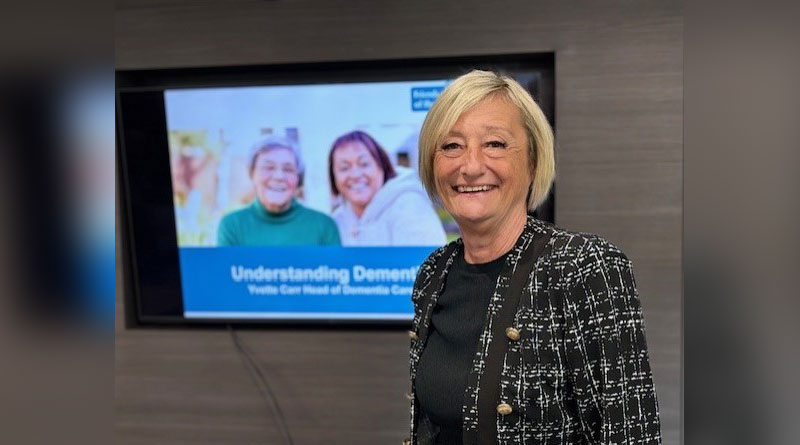
Friends Of The Elderly’s Head Of Dementia Care – Yvette Carr – Supports World Alzheimer’s Month
In support of this year’s World Alzheimer’s Month and World Alzheimer’s Day, charity Friends of the Elderly’s Head of Dementia Care, Yvette Carr, is sharing her experiences and ongoing initiatives of how she works to support older people who are living with dementia.
Yvette has worked in the Care Sector for over 40 years, originally as an Orthopaedic Nurse and then as a District Nurse. She joined Friends of the Elderly in 2018 and has been the charity’s Head of Dementia Care since January 2025, having worked with people living with dementia her whole career.
“I have always naturally been inclined to help others and feel a deep sense of empathy which has always been a strong motivator for me,” said Yvette. “Working in care and especially supporting those who are living with dementia, has provided me with a profound sense of purpose knowing that my efforts can directly improve the quality of life for vulnerable individuals and can be incredibly fulfilling.”
One of Yvette’s many dementia-focused projects is managing the charity’s Dementia Champions Programme. “At Friends of the Elderly we are committed to ensuring all staff members at all levels, including the Senior Management Team and Trustees, receive core and ongoing training on dementia care,” continued Yvette. “After the age of 65, the likelihood of developing dementia roughly doubles every five years. We recognised this and took action and worked in partnership with the University of Worcester’s highly regarded Association for Dementia Studies and the now retired, Professor Dawn Brooker MBE to create our Dementia Education Programme.
“We now have 34 trained Dementia Champions who work in our care homes and day care services focusing on supporting the residents and clients, their families and friends.”
Friends of the Elderly is committed to embedding a dementia friendly culture across the whole of the charity and delivering tailored care that supports and enables people to continue living independent lives. To reinforce this, Yvette hosts regular Dementia Support and Care sessions. “These are free talks which are open to relatives, loved ones and friends on how to support older people who are living with dementia. I share my own experiences of caring for a relative who is living with dementia, talk about a range of techniques, signposts and suggestions and offer helpful insights as well – and, of course, I am there to answer any questions attendees may have,” said Yvette.
Yvette also hosts regular Relative Bitesize Dementia Information Sessions which aim to enable relatives to feel supported and included in the care for their loved one. “The Bitesize Information Sessions can be immensely beneficial as they provide a safe space for individuals to share experiences and feelings with others who truly understand their unique challenges,” continued Yvette. “These groups foster a sense of belonging and reduce isolation, which is especially important for those dealing with the complexities of supporting a loved one through the journey of their dementia.
“By connecting with others who have had, or are going through, similar experiences, participants gain practical advice, emotional support and coping strategies that are tailored to their specific situations. Additionally, these groups empower participants as they create a community where they can openly discuss their struggles, celebrate successes, and learn from one another,” Yvette added.
Creating a dementia-friendly environment is crucial to the wellbeing of those individuals Friends of the Elderly cares for who are living with dementia.
“We ensure that all the physical spaces in our care homes and day care services are safe, supportive and familiar. We use of colours and signage that are easy to navigate and understand, and our wide range of meaningful activities are designed to be inspiring and encourage cognitive functions,” continued Yvette.
“The thing I love most about my job is the opportunity to help and connect with individuals who are living with dementia and their loved ones. Whether it’s providing information, offering support or just having a friendly chat, it’s incredibly rewarding to be part of an individual’s life and help them to maintain their individuality and wellbeing,” Yvette concluded.

